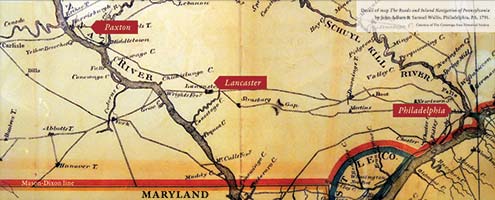Conflict, Genocide and Guilt on the American Frontier
Several biblical stories tell us that the human family is often drawn to seek domination, exclusion, conflict and war rather than God’s reign of inclusion, reconciliation, justice and peace. Our national stories of genocide and displacement of native peoples, slavery and civil war, as well as world wars and ongoing civil rights struggles, make clear that no human culture or century is free from the power of individual sin or communal violence.
Likewise, the people of Saint James have struggled to be faithful to the Biblical vision of God’s kingdom of heaven on earth, as they too failed to see or act on the call to love our neighbors as ourselves. From the perspective of the 21st century, the failures of colonialists regarding indigenous people and enslaved people in the 1700s in Lancaster seem especially evident and painful to behold.
The most notorious genocidal murders in the history of Lancaster occurred in 1763. Scots-Irish settlers from Paxton, feeling unprotected by the Provincial Government, attacked the peaceful village of Conestoga on December 17. With most of the Conestogas away at the time, they massacred women, children and old men. As this group of Native Americans was known by the local population, the remaining Conestoga Indians were placed for safety in the workhouse which adjoined the jail in downtown Lancaster(now the site of the Fulton Theatre).
 On December 27, sixty “Paxton Boys” swept into Lancaster, stormed the jail and killed the fourteen Native Americans sheltering there for whom the town clearly had a duty of care. At the moment of the attack, many prominent Lancastrians were at worship at Saint James when the then circuit-riding pastor, Thomas Barton, was back in town to celebrate the Christmas service.
On December 27, sixty “Paxton Boys” swept into Lancaster, stormed the jail and killed the fourteen Native Americans sheltering there for whom the town clearly had a duty of care. At the moment of the attack, many prominent Lancastrians were at worship at Saint James when the then circuit-riding pastor, Thomas Barton, was back in town to celebrate the Christmas service.
Who was to blame?
In trying to understand this incident historians have wrestled with many questions:
Was this a case of collusion, premeditation and conspiracy on the part of law and order officials, many of whom were worshipping at Saint James when the massacre was reported? Did the Paxton Boys know that if they came into town at a given hour there would be few to defend the Conestogas? Could a priest such as Thomas Barton, sent by a missionary society to support settlers and evangelize native people, and who sought permission to establish an Indian School at Saint James, end up participating in any way in the death of Conestoga Indians who were already Christian converts? Was the violence and climate of fear across the frontier during the French & Indian War so traumatizing for settlers that such a horrific crime and genocide could seem justifiable to them? Did Thomas Barton write the anonymous tract, The Conduct of the Paxton Men, an opinion held by later Barton descendants, which blamed the atrocities on the inaction and complacency of comfortable Quakers living securely in Philadelphia?
As research and understanding grow, historians will hopefully help congregations like Saint James and all Americans take responsibility for thoughts, words and deeds that enable injustice, violence, slavery and genocide.
